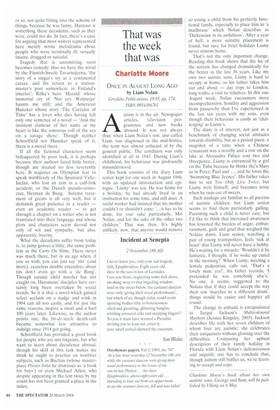That was the week that was
Charlotte Moore
ONCE IN AUGUST LONG AGO by Liam Nolan Greylake Publications, £9.95, pp. 174, ISBN 0954386701 Autisin is in the air. Newspaper articles, television programmes and new books abound. It was not always thus: when Liam Nolan's son, also called Liam, was diagnosed in the mid-Sixties, the term was almost unheard of by the general public. The condition was only identified at all in 1943. During Liam's childhood, his behaviour was profoundly misunderstood.
This book consists of the diary Liam senior kept for one week in August 1968, with an updated introduction and epilogue. `Liamy' was ten. He was home for a holiday; he had already lived in an institution for some time, and still does, A social worker had insisted that his mother couldn't or shouldn't cope: `...it has to be done, for your sake particularly, Mrs Nolan, and for the sake of the other two children.' That was then, It's highly unlikely, now, that anyone would remove
so young a child from his perfectly functional family, especially to place him in 'a madhouse' which Nolan describes as 'Dickensian in its awfulness'. After a year of hell, a more suitable placement is found, but save for brief holidays Liamy never returns home.
That's not the only important change. Reading this hook shows that the lot of the autistic has changed dramatically for the better in the last 36 years. Like my own two autistic sons. Liamy is hard to occupy at home, so his father takes him out and about — day trips to London, long walks, a visit to relatives. In this one August week, Nolan encounters more incomprehension, hostility and aggression from passers-by than I've experienced in the last ten years with my sons, even though their behaviour is easily as 'challenging' as Liarny's.
The diary is of interest, not just as a benchmark of changing social attitudes towards disability, but as a period piece, a snapshot of a time when a Chinese restaurant was a novelty and a row on the lake at Alexandra Palace cost two and threepence. Liamy is entranced by a girl on the Tube because he thinks she's Mary as in Peter, Paul and ..., and he loves the 'Swimming Blue Jeence'. His father takes him to see You Only Live Twice, but Liamy wets himself, and becomes noisy when he runs out of sweets.
Such mishaps are familiar to all parents of autistic children, but Liam senior seems to find them particularly galling. Parenting such a child is never easy, but I'd like to think that increased awareness has lessened the burden of anger, embarrassment, guilt and grief that weighed the Nolans down. Liam senior, watching a pair of young trainspotters. feels 'sick at heart' that Liamy will never have a hobby. He's waiting for a miracle: 'Wouldn't it be fantastic, I thought, if he woke up cured in the morning?' When Liamy, meeting a female pedestrian, calls out, 'That's a lovely man, yes!', his father records, 'I pretended he was somebody else's.' No one, it seems, suggested to the Nolans that if they could accept the way their son 'marches to a different drum', things would be easier and happier all round.
The change in attitude is encapsulated in Jacqui Jackson's Multicoloured Mayhem (Jessica Kingsley, 2003). Jackson describes life with her seven children of whom four are autistic; she celebrates their uniqueness without glossing over the difficulties. Comparing her upbeat description of their family holiday in Florida with Liam Nolan's defensiveness and anguish, one has to conclude that, though autism still baffles us, we're learning to accept and cope.
Charlotte Moore's book about her own autistic sons, George and Sam, will be published by Viking on 6 May.


















































































 Previous page
Previous page